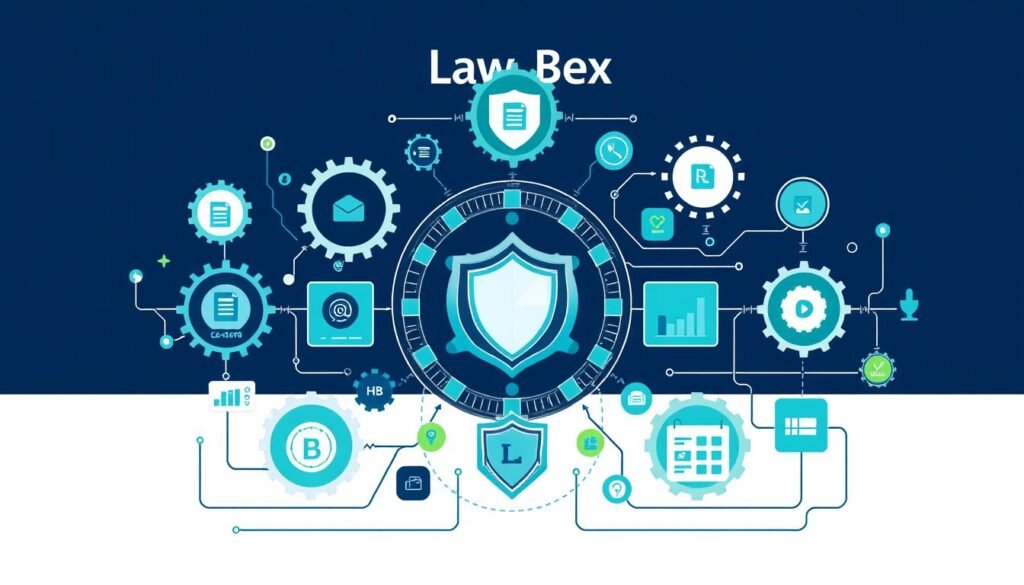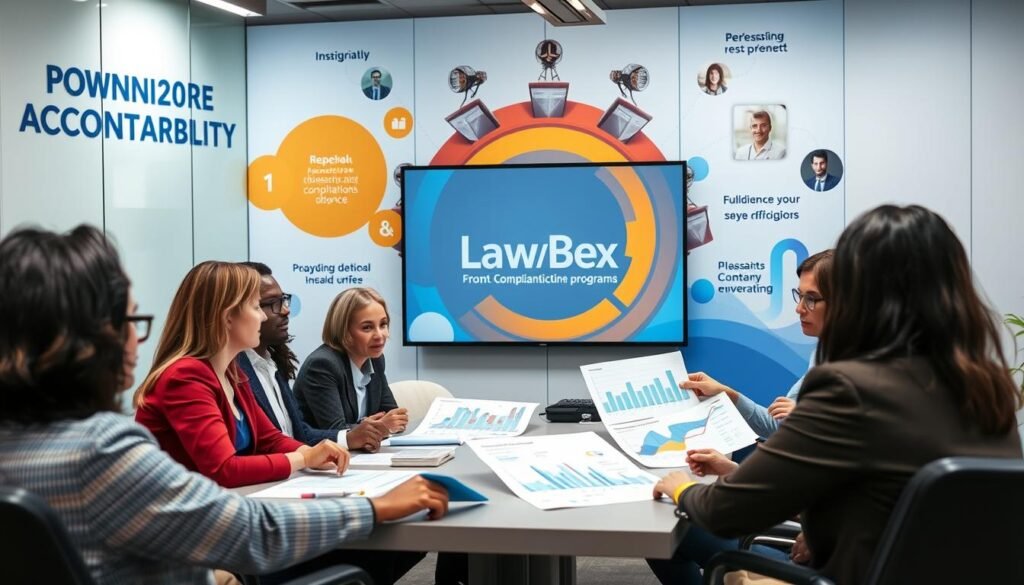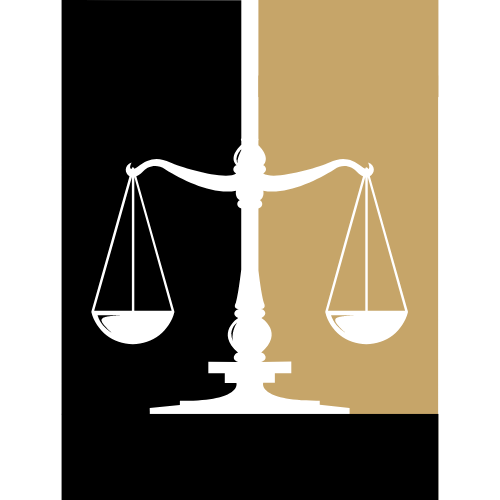Did you know the average cost of a data breach in the United States is $9.44 million? This shows how important compliance is today. It makes sure companies follow many laws and standards.
Compliance means a company follows its legal and ethical duties. It involves many areas like corporate governance and risk management. It’s key for companies to stay safe and honest.
Key Takeaways
- Compliance is the cornerstone of ethical and regulatory oversight in business operations.
- Compliance encompasses adhering to legal, ethical, and industry-specific regulations and standards.
- Effective compliance programs help organizations mitigate risks, ensure accountability, and maintain the highest standards of integrity.
- Understanding the definition and critical aspects of compliance is essential for organizations to navigate the complex business landscape.
- Compliance is a multifaceted concept that encompasses corporate governance, risk management, internal controls, and ethical standards.
What Is the Definition of Compliance?
Compliance means following laws, rules, and ethical standards set by different groups. This includes regulatory bodies, industry associations, and a company’s own policies. It’s about the steps businesses take to make sure they meet these standards.
At its heart, compliance helps reduce risks and keeps an organization’s integrity. By following regulatory requirements, corporate governance guidelines, and risk management plans, companies build trust. They also avoid big fines or damage to their reputation.
Compliance touches many areas, like financial reports, data privacy, and environmental rules. Companies must keep up with changing laws to stay legal and ethical.
- Compliance ensures adherence to laws, regulations, and internal policies
- It helps organizations mitigate risks and maintain integrity
- Compliance spans various areas, from financial reporting to data privacy
- Organizations must continuously update their compliance programs to keep pace with regulatory changes
“Compliance is not just about following the rules – it’s about building a culture of integrity and accountability within an organization.”
Compliance with Regulatory Requirements
Compliance is not just a choice, but a must for businesses in many industries. It’s key to avoid big fines and keep a good reputation. We’ll look at why it’s important to know and follow the rules.
Understanding Legal Obligations
Businesses need to keep up with the laws they must follow. This means following regulatory requirements from government agencies and more. Not following these can cause big problems, like fines and even shutting down.
Industry-Specific Regulations
Every industry has its own industry-specific regulations. These rules help keep things safe and fair. From healthcare to finance, each field has its own legal obligations that must be followed closely.
| Industry | Key Regulations |
|---|---|
| Healthcare | HIPAA, FDA regulations, CMS guidelines |
| Finance | Sarbanes-Oxley Act, FINRA regulations, CFPB guidelines |
| Manufacturing | OSHA standards, EPA regulations, ISO certifications |
Understanding regulatory requirements and industry-specific regulations is vital for businesses. Keeping up and following these rules helps avoid big problems. It’s important for a business to stay safe and keep going strong.

Compliance and Corporate Governance
Compliance and corporate governance go hand in hand. They help organizations set up good processes and controls. This ensures they act ethically and follow the law.
Good governance is key. It helps businesses make smart decisions and manage risks. This keeps their reputation and success safe.
At the heart of this is a strong corporate governance framework. It puts compliance at its core. This framework guides how the company makes decisions and handles risks.
By linking compliance with corporate governance, companies build trust. They also stay ahead in the market.
Strong compliance programs and internal controls are vital. They help companies deal with complex rules. This way, they can spot and handle risks effectively.
By making compliance a part of their corporate governance, businesses get better. They become more resilient and ready for change.
“Compliance is not just a legal obligation, but a strategic imperative for organizations seeking to build long-term value and maintain a sustainable competitive advantage.”
In short, compliance and corporate governance are crucial for any business. They help create a culture of accountability and smart decision-making. This sets the stage for growth and success in a tough business world.
Risk Management and Compliance
Compliance is more than just following rules. It’s a key part of keeping an organization safe and strong. Compliance experts help protect the company’s future by managing risks.
Identifying and Mitigating Risks
Risk management and compliance work together well. Compliance teams find and fix risks early on. This stops big problems like fines, bad reputation, or business stops.
Compliance experts team up with legal, finance, and operations. They learn about all risks the company faces. This helps them keep the company safe and up-to-date with rules.

“Effective risk management and compliance go hand in hand. By identifying and mitigating potential threats, organizations can safeguard their operational integrity and long-term sustainability.”
A strong risk management and compliance plan helps companies react fast to new risks. This is key in today’s quick-changing business world. Being able to quickly adapt can mean the difference between success and failure.
Internal Controls and Auditing Processes
Keeping an organization in line with rules and standards is complex. It needs strong internal controls and auditing. These steps help check if the company follows rules and acts ethically. This makes the company’s compliance stronger.
Internal controls are key to a good compliance program. They include rules and checks to reduce risks and ensure honest financial reports. Things like separating tasks and checking who can do what help keep the company safe from rule breaks.
Auditing processes are another important part. They check if the company’s controls work well. Audits, both inside and outside, look for weak spots and rule breaks. This helps the company fix problems fast and keep everyone accountable.
- Internal controls: Establishing robust procedures, policies, and practices to mitigate risks and ensure compliance
- Auditing processes: Conducting regular internal and external audits to evaluate the effectiveness of control measures and identify areas for improvement
- Promoting a culture of accountability: Fostering an environment where compliance is a shared responsibility among all employees
By using internal controls and auditing processes, companies can keep track of their rule following. This not only helps with compliance but also with managing risks. It helps the company stay safe and successful in the long run.
“Effective compliance programs are built on a foundation of robust internal controls and rigorous auditing processes. These mechanisms are essential for organizations to identify and address compliance risks, ensuring they operate with integrity and transparency.”
Definition of Compliance: Ethical Standards
Compliance is more than just following laws and rules. It also means sticking to ethical standards. Companies work hard to keep a strong ethical culture. They focus on teaching employees to act ethically.
This is key for keeping a good reputation. It also helps create a work place that matches the company’s values.
Promoting Ethical Behavior
Building an ethical culture needs a few steps. Leaders must show they care about ethics. They should share these values with everyone in the company.
Also, training employees on ethics is important. This helps them deal with tough choices. It makes sure they act in line with the company’s values.
Code of Conduct and Ethics Policies
A clear code of conduct and ethics policies are the base for ethics. They tell employees what is expected of them. This includes everyone, no matter their job.
These policies make sure everyone knows what’s expected. They help make sure ethics are part of every decision and action.
Having strong compliance programs that focus on ethics is key. It helps companies be seen as honest and trustworthy. By teaching ethics and having clear rules, companies can build a lasting culture of compliance.

| Key Elements of an Ethical Compliance Program | Description |
|---|---|
| Ethical Leadership | Demonstrating a strong commitment to ethical standards from the top down and ensuring consistent communication of these values. |
| Comprehensive Ethics Training | Providing employees with the knowledge and skills to recognize and address ethical dilemmas, enabling them to make informed decisions. |
| Clear Code of Conduct | Outlining the organization’s ethical expectations, guidelines, and procedures that all employees must adhere to. |
| Robust Ethics Policies | Establishing comprehensive policies that integrate ethical considerations into daily decision-making and operations. |
| Accountability Measures | Implementing systems and processes to ensure adherence to ethical standards and accountability for any violations. |
“Ethical behavior is the foundation of a successful compliance program. By fostering a culture of integrity, organizations can build trust and maintain their reputation in the long-term.”
Policy Adherence and Accountability Measures
Following policies in an organization is more than just setting rules. It’s about making sure everyone knows they’re responsible for following them. This way, we create a culture where everyone acts ethically and follows the rules.
Monitoring and checking policies regularly is crucial. We need to keep our policies current with new laws and best practices. Also, we must have strong controls to catch any rule-breaking.
| Accountability Measures | Description |
|---|---|
| Performance Evaluations | Make sure compliance is part of how we judge employees. This way, everyone knows they must follow the rules. |
| Disciplinary Actions | Have clear rules for when someone breaks the rules. This could mean warnings, suspensions, or even firing. |
| Compliance Reporting | Make sure everyone knows about any compliance issues. This keeps everyone informed and helps solve problems. |
By using these measures, we build a strong culture of policy adherence. This improves our corporate governance and helps us avoid risks. It also keeps us in line with the law and ensures we act ethically.
Compliance and Risk Management Frameworks
Compliance is key to an organization’s risk management strategy. A good compliance program is vital for following rules, avoiding risks, and keeping the business successful.
Establishing a Compliance Program
Creating a strong compliance program needs several important steps. These steps help build a solid risk management system. They include:
- Knowing and understanding the risk management frameworks and rules that apply to the company.
- Setting up internal controls and processes to follow these rules and frameworks.
- Using strong auditing processes to check and review the company’s compliance work.
- Creating a culture of compliance and ethics in the organization.
- Giving enough resources and roles to the compliance program and its team.
By focusing on these steps, companies can build a detailed compliance program. This program fits well with their risk management strategy. It helps reduce risks, keeps rules, and upholds the company’s ethics.

“Effective compliance programs are not just about checking boxes. They are a key strategy for companies to deal with complex rules and protect their future.”
| Key Elements of a Compliance Program | Benefits |
|---|---|
| Identifying and understanding relevant risk management frameworks and regulations | Ensures the organization is aware of its legal obligations and industry-specific requirements |
| Implementing internal controls and processes | Helps to mitigate risks and maintain adherence to compliance standards |
| Robust auditing processes | Provides regular oversight and evaluation of the compliance program’s effectiveness |
| Fostering a culture of compliance and ethical behavior | Promotes responsible decision-making and a commitment to integrity throughout the organization |
| Allocating resources and responsibilities to a dedicated compliance program | Ensures the compliance program receives the necessary support and attention to be successful |
The Role of Compliance Officers
Compliance officers are key to making sure companies follow the law and act ethically. They create and enforce compliance programs. These programs help avoid risks and keep the company’s good name.
Responsibilities and Qualifications
Compliance officers do many things in a company. Their main tasks include:
- Figuring out and understanding laws and rules
- Creating and putting into action compliance rules and controls
- Doing risk checks and finding ways to lower risks
- Teaching employees about following rules
- Watching and reporting on how well the company follows rules
- Working with other teams, like legal and audit, for better compliance
To do their jobs well, compliance officers need certain skills and experience. They usually have:
- A degree in business, law, or compliance
- Certifications like CCEP or CRISC
- Years of experience in compliance, risk, or internal controls
- Good analytical, problem-solving, and communication skills
Thanks to their knowledge and hard work, compliance officers help build a culture of ethics. They make sure the company follows the law and rules.
Benefits of Effective Compliance Programs
Having strong compliance programs helps companies in many ways. They reduce risks, improve how a company is run, and encourage doing the right thing. These efforts protect a company from legal and reputation problems, helping it succeed over time.
One big plus of good compliance programs is they cut down on risks. They set up clear rules and controls. This way, companies can spot and fix problems early. This helps avoid expensive lawsuits, fines, and damage to their reputation.
Compliance programs also make a company’s corporate governance better. They make things clear, accountable, and ethical. This means the company follows rules and acts responsibly. It builds trust with people who care about the company and shows it’s serious about doing things right.
Maybe the best thing about compliance programs is they help create a culture of ethical standards. By having rules and training, companies can make a place where doing the right thing is normal. This makes employees happy and keeps the company’s good name safe.
“Effective compliance programs are not just a box to check; they are a strategic asset that can drive business success and sustainable growth.”
In short, strong compliance programs offer many benefits. They help manage risks, improve how a company is run, and make sure everyone acts ethically. This makes a company stronger, more trusted, and ready for the future.

| Benefit | Description |
|---|---|
| Risk Mitigation | Compliance programs help organizations proactively identify and address potential risks, avoiding costly legal and regulatory issues. |
| Enhanced Corporate Governance | Compliance programs promote transparency, accountability, and ethical decision-making, improving stakeholder trust and demonstrating a commitment to responsible business practices. |
| Ethical Culture Promotion | Compliance programs cultivate a work environment where ethical behavior is the norm, enhancing employee morale and protecting the organization’s reputation. |
Challenges in Maintaining Compliance
Keeping up with changing compliance rules is tough for all kinds of businesses. Rules and standards keep shifting, making it hard for companies to stay in line. This part talks about the big hurdles companies face in managing compliance.
Staying Up-to-Date with Regulations
One big problem is keeping up with new rules. Companies must watch for and adjust to new laws and guidelines. This means they need to spend time learning, understanding, and applying these changes.
Compliance rules can be very complex and different for each industry and place. This makes it hard for small and medium businesses to keep up. It takes a lot of time and effort to make sure they are following all the rules.
| Compliance Challenge | Impact on Businesses |
|---|---|
| Regulatory Changes | Increased administrative burden, potential legal penalties, and reputational damage |
| Complexity of Compliance Requirements | Difficulty in interpreting and implementing changes, higher compliance management costs |
| Lack of Dedicated Compliance Resources | Increased risk of non-compliance, reduced efficiency in compliance management |
To tackle these issues, companies need to make compliance a top priority. They should invest in strong compliance management systems. This might mean hiring special compliance officers, using automated tools, and regularly updating policies to match new rules.
“Maintaining compliance is a continual process that requires vigilance, flexibility, and a proactive approach. Businesses that embrace compliance as a strategic priority are better positioned to navigate the complexities of the regulatory landscape and mitigate the risks associated with non-compliance.”
By tackling compliance challenges, companies can protect their good name, avoid big fines, and foster a culture of ethics and responsibility.
SMALL BUSINESS LEGAL GUIDANCE: EXPERT SUPPORT FOR SMES
Conclusion
The definition of compliance is complex and vital for businesses to thrive. It includes regulatory requirements, corporate governance, and risk management. It also covers internal controls, auditing, and ethical standards.
Following legal obligations and industry rules is key. It keeps businesses in line with the law and industry standards. Good corporate governance and risk management are also crucial. They help spot and fix potential problems that could harm the business.
Creating a culture of ethics and accountability is important. It builds trust with stakeholders. A strong commitment to compliance is not just a must. It’s also a smart business move that leads to success and growth.
